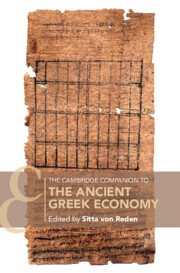Book contents
- The Cambridge Companion to the Ancient Greek Economy
- The Cambridge Companion to the Ancient Greek Economy
- Copyright page
- Contents
- Maps
- Notes on the Contributors
- Abbreviations
- Maps
- 1 Introduction
- Part I Diachronic Perspectives
- 2 Early Iron Age Economies
- 3 The Archaic Period
- 4 The Classical Period
- 5 Hellenistic Economies
- Part II Regional Perspectives
- Part III Structures and Processes
- Part IV Networks
- Part V Performance
- References
- Index
- Cambridge Companions to the Ancient World
4 - The Classical Period
from Part I - Diachronic Perspectives
Published online by Cambridge University Press: 21 July 2022
- The Cambridge Companion to the Ancient Greek Economy
- The Cambridge Companion to the Ancient Greek Economy
- Copyright page
- Contents
- Maps
- Notes on the Contributors
- Abbreviations
- Maps
- 1 Introduction
- Part I Diachronic Perspectives
- 2 Early Iron Age Economies
- 3 The Archaic Period
- 4 The Classical Period
- 5 Hellenistic Economies
- Part II Regional Perspectives
- Part III Structures and Processes
- Part IV Networks
- Part V Performance
- References
- Index
- Cambridge Companions to the Ancient World
Summary
This chapter surveys the major developments in the economic history of the Greek world in the classical period (479–323 BCE). While agricultural practices and productive capacities did not change dramatically, this was a period characterized by a massive increase in the demand for certain commodities, especially timber for the ship-building and monumental-construction efforts of the period and grain to meet the dietary needs of a growing human population. It also considers the major developments in the supply and circulation of coinage in the classical period and the emergence of private banking and the expansion of credit, all of which facilitated both local and long-distance trade. As trade intensified throughout the Aegean and poleis developed more sophisticated institutions for local governance, they developed strategies to derive revenue from trade and imposed regulations on both the production and trade of commodities in which they had a special interest.
Keywords
- Type
- Chapter
- Information
- The Cambridge Companion to the Ancient Greek Economy , pp. 49 - 60Publisher: Cambridge University PressPrint publication year: 2022

